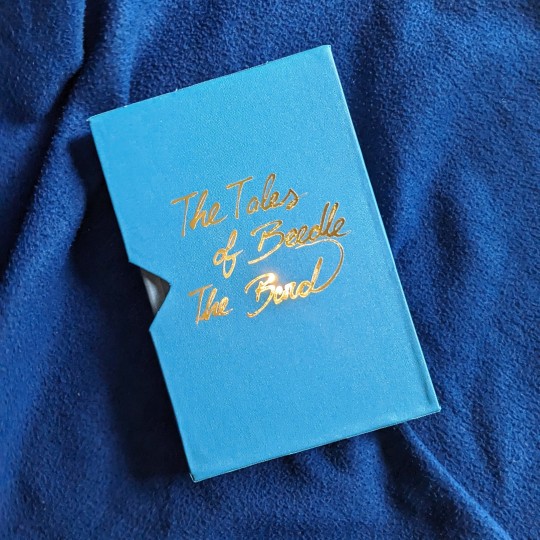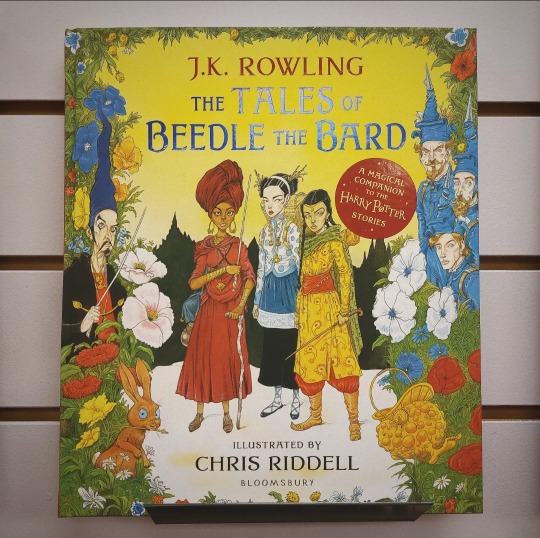#The tales of Beedle the Bard
Text


Something inside of me healed today… I cried for few seconds because I mean my teenage self would have gone batshit crazy if she ever laid her hands on this.
[ The Tales Of Beedle the Bard, translated from the original runes by Hermione Granger ]
#the tales of beedle the bard#harry potter#hermoine granger#ron weasley#jk rowling#muggle world#muggle reader#muggleborn#muggle studies#quidditch#hogwarts school of witchcraft and wizardry#witches#wizardblr#witchblr#draco malfoy#griffindor#slytherin#hufflepuff#ravenclaw#desiblr#desi tumblr#desi tag#being desi#desi aesthetic#desi academia#desi blog#desi girl#desi blr#desi#desi culture
68 notes
·
View notes
Text






I'm so excited to finally be able to share this!
The Tales of Beedle the Bard, rebind trade with @/floralbearies
This is my very first book trade since I joined the community May/June, me and Jessica always said ooh let's do a trade, and we finally made it happen! Thank you so much for trading with me and I hope we will do more in the future
About the bind:
purchased 2nd hand
text on the slipcase is my own handwriting! Wasn't sure if my cricut would be handle it with the textured brush I picked, but it turned out pretty well
Cover design is drawn by me on Clip studio paint, featuring three of the stories in the book. Can you guess which one they are?
it embarrassingly took me way too long to sit my ass down and design the cover, but once it started, it went pretty fast! I haven't read the book before so I also had to read it before I could come up with a good design. My personal favorite story is the one of the hairy heart
endpapers are marbled papers I purchased on etsy, I bought a bunch a while back and been dying to use them for some of my binds! Picked the red one because I originally wanted to pick red cloth but went for the gray in the end
#bookbinding#book binding#the tales of beedle the bard#jk rowling#harry potter#hogwarts#eggfriedpenguin
94 notes
·
View notes
Text

“Mum use to read those to me as a kid!” -Ron Weasley
(Harry Potter and the Deathly Hallows)
#quote#harry potter#hogwarts#universal studios#wizarding world#wizarding world of harry potter#gryffindor#hp#hogwarts is my home#ron weasley#Weasley#the tales of beedle the bard
12 notes
·
View notes
Text
My Options And Interpretations of "The Tales Of Beedle The Bard"
"The Wizard And The Hopping Pot" p1
The story:
There was once a kindly old wizard who used his magic generously and wisely for the benefit of his neighbours. Rather than reveal the true source of his power, he pretended that his potions, charms and antidotes sprang ready-made from the little cauldron he called his lucky cooking pot. From miles around people came to him with their troubles, and the wizard was pleased to give his pot a stir and put things right.
This well-beloved wizard lived to a goodly age, then died, leaving all his chattels to his only son. This son was of a very different disposition to his gentle father. Those who could not work magic were, to the son’s mind, worthless, and he had often quarrelled with his father’s habit of dispensing magical aid to their neighbours.
Upon the father’s death, the son found hidden inside the old cooking pot a small package bearing his name. He opened it, hoping for gold, but found instead a soft, thick slipper, much too small to wear, and with no pair. A fragment of parchment within the slipper bore the words “In the fond hope, my son, that you will never need it.”
The son cursed his father’s age-softened mind,then threw the slipper back into the cauldron, resolving to use it henceforth as a rubbish pail.
That very night a peasant woman knocked on the front door.
“My granddaughter is afflicted by a crop of warts, sir,” she told him. “Your father used to mix a special poultice in that old cooking pot –” “Begone!” cried the son. “What care I for your brat’s warts?” And he slammed the door in the old woman’s face.
At once there came a loud clanging and banging from his kitchen. The wizard lit his wand and opened the door, and there, to his amazement, he saw his father’s old cooking pot; it had sprouted a single foot of brass, and was hopping on the spot, in the middle of the floor, making a fearful noise upon the flagstones. The wizard approached it in wonder, but fell back hurriedly when he saw that the whole of the pot’s surface was covered in warts.
“Disgusting object!” he cried, and he tried firstly to Vanish the pot, then to clean it by magic, and finally to force it out of the house. None of his spells worked, however, and he was unable to prevent the pot hopping after him out of the kitchen, and then following him up to bed, clanging and banging loudly on every wooden stair.
The wizard could not sleep all night for the banging of the warty old pot by his bedside, and next morning the pot insisted upon hopping after him to the breakfast table. Clang, clang, clang, went the brass-footed pot, and the wizard had not even started his porridge when there came another knock on the door.
An old man stood on the doorstep. “’Tis my old donkey, sir,” he explained. “Lost, she is, or stolen, and without her I cannot take my wares to market, and my family will go hungry tonight.”
“And I am hungry now!” roared the wizard, and he slammed the door upon the old man. Clang, clang, clang, went the cooking pot’s single brass foot upon the floor, but now its clamour was mixed with the brays of a donkey and human groans of hunger, echoing from the depths of the pot.
“Be still. Be silent!” shrieked the wizard, but not all his magical powers could quieten the warty pot, which hopped at his heels all day, braying and groaning and clanging, no matter where he went or what he did.
That evening there came a third knock upon the door, and there on the threshold stood a young woman sobbing as though her heart would break.
“My baby is grievously ill,” she said. “Won’t you please help us? Your father bade me come if troubled –”
But the wizard slammed the door on her. And now the tormenting pot filled to the brim with salt water, and slopped tears all over the floor as it hopped, and brayed, and groaned, and sprouted more warts.
Though no more villagers came to seek help at the wizard’s cottage for the rest of the week, the pot kept him informed of their many ills. Within a few days, it was not only braying and groaning and slopping and hopping and sprout- ing warts, it was also choking and retching, crying like a baby, whining like a dog, and spewing out bad cheese and sour milk and a plague of hungry slugs.
The wizard could not sleep or eat with the pot beside him, but the pot refused to leave, and he could not silence it or force it to be still. At last the wizard could bear it no more. “Bring me all your problems, all your troubles and your woes!” he screamed, fleeing into the night, with the pot hopping behind him along the road into the village. “Come! Let me cure you, mend you and comfort you! I have my father’s cooking pot, and I shall make you well!” And with the foul pot still bounding along behind him, he ran up the street, casting spells in every direction.
Part 2
7 notes
·
View notes
Text
Death comes for us all in the end.
J.K. Rowling, The Tales of Beedle the Bard
#jkr#jk rowling#j.k. rowling#trans rights#fuck jkr#harry potter#the tales of beedle the bard#beedle the bard#quotes
4 notes
·
View notes
Text

HOW I UNWIND #page33 #pagina33
#AUGUSTBREAK2024 @SUSANNAHCONWAY
The Tales of Beedle the Bard
#page33#pagina33#currently reading#in lettura#AUGUSTBREAK2024#HOW I UNWIND#harry potter#hermione granger#cedric diggory#book#books#bookaddict#bookaholic#bookworm#iltempodileggere#the tales of beedle the bard#bookmark
0 notes
Text
“It was Death and he felt cheated.”
..
..

..
..
“Jupiter could have never been a star, our sun took the recourses and didn’t leave much in its wake…”
..
“Jupiter isn’t a failure, it’s a falsehood of misguided hope. A personification of desperation.”
#the three brothers#harry potter deathly hallows#deathly hallows#tales of beedle the bard#this quote was found on TikTok by user#deli._.rat#I love this quote and take so much#harry potter moodboard#harry potter#Tessa’s moodbaords
18 notes
·
View notes
Text
The Death Tarot Card. Harry Potter. Deathly Hallows.



#digital art#harry potter#fanart#death#tarot cards#tarot#deathly hallows#elder wand#resurrection stone#invisibility cloak#the tale of the three brothers#beedle the bard#harry potter fanart#harry potter fandom#illustration
3 notes
·
View notes
Text
I think someone should write Harry Potter Fanfiction where a trans man wizard gets the Elderwand.
#I'm cleaning and found my copy of the tales of beedle the bard#in it it says that no witch has ever claimed the Elderwand#so i think you know#trans man gets the Elderwand little fuck you to Joanne#(i don't like Harry Potter anymore but it used to be a huge interest of mine)#harry potter#harry potter fic idea#harry potter fanfiction#jamie shut the fuck up#personal blog#just vibing#rambling#books#writing
1 note
·
View note
Text
Say what you want but The Warlock's Hairy Heart is peak romance idc what the haters say
#jkr did not do many things right#actually nost things she has not done MOST things right she has been very WRONG actually#but making up a new fairytale THAT unhinged was not one of them 🙏#i keep forgetting it's not a real one that i can reference in casual conversation and have people know wtf im talking about#harry potter#the warlocks hairy heart#the tales of beedle and the bard#actually im not entirely certain jkr wrote those herself :/#might be a cursed child situation there....#Here Write This Part of My Story's Worldbuilding I Cant Be Bothered To 🙄#anyway#i havent actually read it in a while i may overgrandizing it#however the base premise still fucks severely so idts
0 notes
Text

The Tales of Beedle The Bard
0 notes
Text
To hurt is as human as to breathe.
-J.K. Rowling, The Tales of Beedle the Bard (Hogwarts Library, #3)
#jk rowling#book quote#poetry#quotes#beautiful quote#life quotes#quo#life#people#tales#the tale of beedle the bard#Hogwarts#hurt#human#breathe
0 notes
Text
Beedle’s stories resemble our fairy tales in many respects; for instance, virtue is usually rewarded and wickedness punished. However, there is one very obvious difference. In Muggle fairy tales, magic tends to lie at the root of the hero or heroine’s troubles - the wicked witch has poisoned the apple, or put the princess into a hundred years’ sleep, or turned the prince into a hideous beast. In The Tales of Beedle the Bard, on the other hand, we meet heroes and heroines who can perform magic themselves, and yet find it just as hard to solve their problems as we do. Beedle’s stories have helped generations of wizarding parents to explain this painful fact of life to their young children: that magic causes as much trouble as it cures.
---JK Rowling/The Tales of Beedle the Bard (Introduction)
0 notes
Text
My Opinions and Interpretations of "The Tales Of Beedle The bard"
Introduction:
"The Tales Of Beedle The Bard", is a collection of stories written for young witches and wizards. They have been popular bedtime reading for centuries, with the result that the Hopping Pot and the Fountain of Fair Fortune are as familiar to many students at Hogwarts as Cinderella and Sleeping Beauty are to Muggle children.
Beedle's stories resemble our fairy tales in many respects; for instance, virtue is usually rewarded, and wickedness punished. However, the is one very obvious difference. In Muggle fairy tales, magic tends to lie at the root of the hero's or heroin's troubles - the wicked witch has the poisoned apple, or put the princess into a hundred-year's sleep, or turned the prince into a hideous beast. I'm the takes of Beedle the bard, on the other hand, we met heros and heroins who can perform magic themselves, and yet find it just as hard to solve their problems as we do. Beedle's stories have helped generations of Wizarding parents this painful fact of life to their young children,that magic causes as much trouble as it cures.
Another notable difference between these games and their Muggle counterparts is that Beedle's witches are much more active in seeking their fortunes than our fairy-tale heroins. Asha, Altheda, Amata, and Babbitty Rabbity are all witches who take their fates into their own hands, Rather than taking a prolonged nap or waiting for someone to return their list shoe. The exception to this rule, the unarmed maiden of The Warlock's Hairy Heart, acts more like our idea of a storybook princess, but there is no happily ever after at the end of her tale.
Beedle the Bard lived in the fifteenth century, and much of his life remains shrouded in mystery. We know he was born in Yorkshire and the only surviving Woodcut shows that he had an exceptionally luxuriant beard. If his stories accurately reflect his opinions, me Rather liked Muggles, whom he regarded as ignorant rather than malevolent; he mistrusted Dark Magic, and he believed that the worst recess of Wizardkind sprang from the all-too-human traits of cruelty, apathy, it arrogant misapplication of their own talents. The heros and heroins who triumph in his stories are not this with the most power-full magic, but rather those who demonstrate the most kindness, common sense, and ingenuity.
One modern-day wizard who held very similar views was, of course, Professor Albus Percival Wulfric Brian Dumbledore, Order of Merlin (first class), Headmaster of Hogwarts School of Witchcraft and Wizardry, Supreme Mugwump of the International Confederation of Wizards, and Chief Warlock of the Winzengamot. The similarity of outlook notwithstanding, it was a surprise to discover a set of notes on The Tales of Beedle the Bard among the many papers that Dumbledore left in his will to the Hogwarts Archives. Whether this commentary was written for his own satisfaction or for future publication, we shall never know; however, we have been been graciously been given permission by Professor Minerva McGonagall, now Headmistress of Hogwarts, to print Professor Dumbledore's notes here, alongside a brand new translation of The Tales by Hermione Granger. We hope that that Professor Dumbledore's insights, which include observations on Wizarding history, personal reminisces, and information on key elements of each story, will help a new generation of both Wizarding and Muggle readers appreciate The Tales of Beedle the Bard.
It the belief of ash who knew him personally that Professor Dumbledore would have been delighted to lend his his support to this project, given that all royalties are to be donated to the Children's High Level Group, which works to benefit children in desperate need of a voice.
It seems only right to make one small, additional comment on Professor Dumbledore's note. As far as we can tell, the notes were completed around eighteen months before the tragic events at the top of Hogwarts's Astronomy Tower. Those familiar with the history of the most recent Wizarding war (everyone who has read all seven volumes on the life of Harry Potter for instance) will be aware that Professor Dumbledore reveals a little less than he knows - or suspects - about the final story on this book. The reason for any omission lies, perhaps, in what Dumbledore said about truth many years ago, to his favorite and most famous pupil;
"It is a beautiful and terrible thing, and should therefore be treated with great caution."
Weather we are with him or not, we can perhaps excuse Professor Dumbledore for wishing to protect future readers from the temptations to which he himself has taken prey, and for which he payed so terrible a price.
-J.K Rowling, 2008
(from the official Tales Of Beedle The Bard by J.K Rowling)
5 notes
·
View notes
Text
Clever as I am, I remain just as big a fool as anyone else.
J.K. Rowling, The Tales of Beedle the Bard
#j.k. rowling#jk rowling#jkr#fuck jkr#trans rights#harry potter#the tales of beedle the bard#beedle the bard#quotes
0 notes
